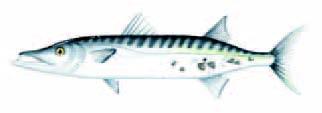200881 Severe food poisoning
 Great barracuda (sphyraera barracuda); Typical mass 40 kg
Great barracuda (sphyraera barracuda); Typical mass 40 kg
One of our ships was at anchorage carrying out bunkering operations in the Netherlands Antilles. A group of officers and crew not involved in these duties went fishing, returning with a large barracuda. Although the ship had a good stock of frozen fish in the provision store, the crew could not resist the temptation of having a 'fresh' one for their evening meal. The chief steward cooked the barracuda and served it to officers and crew at 1800. For various reasons – and fortunately as it turned out – some crew members did not eat the fish.
The ship departed for a US Gulf port at 1930 the same evening. At about 2000, several crew members reported to the ship's medical officer, complaining of stomach ache, and were issued with activated carbon tablets. It was then established that all the unwell crew, including the master, had eaten the barracuda for dinner.
At around midnight, when it became clear that the condition of the affected crew was deteriorating seriously, the master instructed the second officer, who had not eaten the fish, to radio for medical advice. (The symptoms were mainly vomiting and diarrhoea.) Under shore advice, the condition of the sick crew members was monitored constantly overnight and the following morning, it was decided to approach the south coast of Puerto Rico for possible air-lifting of the casualties by helicopter. By this time, the master was unable to come to the bridge, and was vomiting and discharging blood.
Communications were maintained between the ship and shore, and later that afternoon, two helicopter sorties airlifted five seriously ill crew members (including the master). The helicopter team also supplied injections for the other affected crew, while the ship continued on a course to Ponce Anchorage, Puerto Rico, where she arrived later that evening. A medical team, together with the agent, boarded and examined the crew. Out of the total crew complement of 35 persons on board, 23 including the master, were landed and hospitalised ashore. After several days, all of them were repatriated to continue their recovery at home.
Investigations revealed that they were all affected by ciguatera poisoning. This is a common, non bacterial fish-borne form of poisoning, mainly found in tropical regions. It comes from eating reef fish whose flesh is contaminated with ciguatoxin. In some cases, the effects were very serious and long-lasting, especially for the master, who was still unfit for sea service a month after the incident.
Root cause/contributory factors
The crew was unaware of possible health hazards associated with some tropical fish;
Such potential health hazards were not mentioned in the company's SMS manuals, or in the relevant international guidelines such as the Code of Safe Working Practices for Merchant Seamen, MGN 61 Guidelines for Food Hygiene on Merchant Ships and Fishing Vessels etc.
Lessons learned
Ciguatoxin is heat/cold-resistant, so ciguatoxin-laden fish cannot be detoxified by conventional cooking or freezing.
The symptoms of this poisoning are very severe and can last from weeks to years – in extreme cases as long as 20 years – often leading to long-term disability.
Corrective actions
Information about the hazards of such fish poisoning will be included in the company's QA manuals.
The incident was widely circulated within the fleet and discussed during onboard safety committee meetings, and a copy of the bulletin made available for the crew in public areas.
Instructions issued to all ships not to eat fish caught in tropical shallow waters.
Editor's note: More details on ciguatera food poisoning can be obtained from the internet. The website www.mdpi.com/1660-3397/6/3/456/pdf mentions that CFP can result in life-long gastrointestinal (GI), cardiovascular, neurological and neuropsychiatric symptoms. Suppliers of CFP test kits can also be searched, but seafarers and their employers must take serious note of the fact that there is no effective treatment or antidote for CFP.
